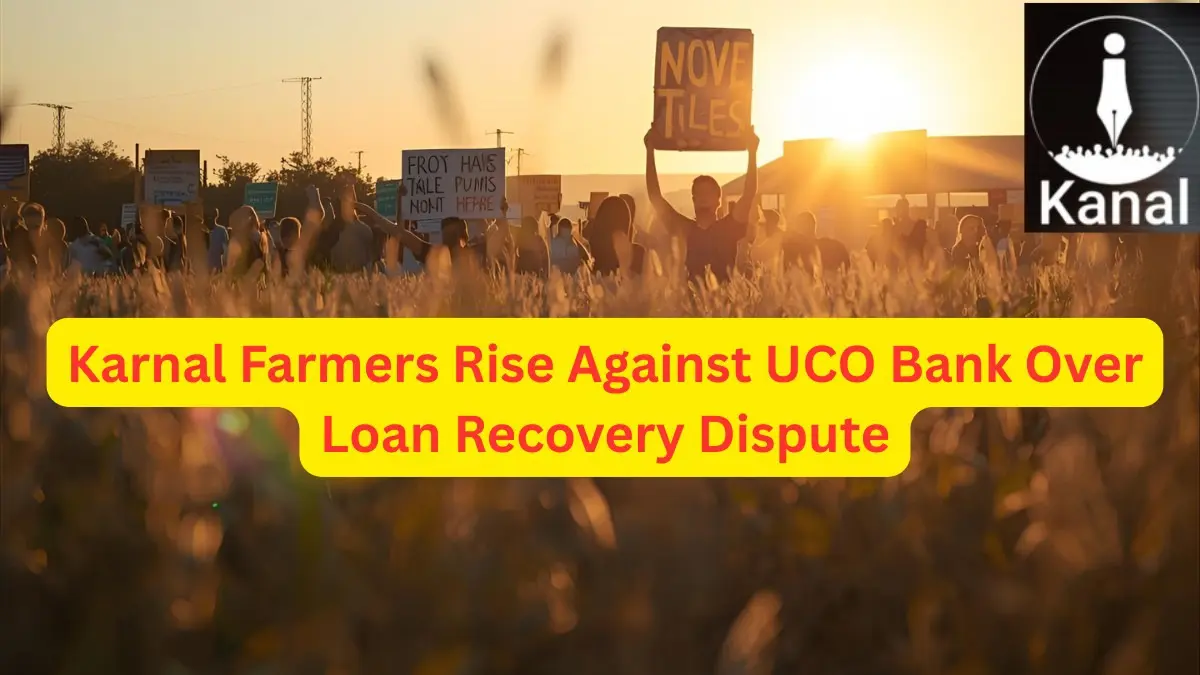Karnal: Farmers in Karnal, Haryana, demonstrated against UCO Bank for allegedly exploiting them with inflated loan recovery demands. The Bharatiya Kisan Union (BKU) protest highlighted the plight of farmers facing extreme debt, as one case revealed a farmer owing nearly four times the original loan after repaying over double the principal amount. The BKU plans to address these issues with local authorities, emphasizing the need for fair treatment of rural borrowers.
- Protest Against UCO Bank: Farmers Demand Fair Treatment
- A Case Study: Madan Pal Rawal’s Struggle
- BKU’s Response: A Call for Debt Relief
- The Broader Context: Rising Debt Among Farmers
- Conclusion: A Pivotal Moment for the Indian Economy
- Bankerpedia’s Insight 💡
- How Does This Affect the Banking Ecosystem? 🏦
- Research References 📚
- Loved our Research? ❤️
Protest Against UCO Bank: Farmers Demand Fair Treatment
On Thursday, members of the Bharatiya Kisan Union (BKU) gathered in Karnal to express their frustrations towards UCO Bank, pointing fingers at the institution for what they described as exploitative loan recovery practices. The protest commenced at Kisan Bhawan and moved toward the regional office, where demonstrators raised slogans and set fire to an effigy symbolizing the bank. This act of defiance underscored the deep-seated anger felt by the farming community in recent months.
A Case Study: Madan Pal Rawal’s Struggle
One particularly striking account emerged from the protests. Farmers rallied behind Madan Pal Rawal, who detailed his arduous experiences with UCO Bank. His father had taken out a loan of approximately ₹1.47 crore from the bank’s Panipat branch in 2013 to start a poultry farm. Risking financial security, the family ventured into poultry farming, a sector fraught with volatility. After his father’s passing in 2016, Madan Pal dedicated himself to repaying this hefty sum, and by 2020, he had paid back around ₹2.35 crore.
However, the COVID-19 pandemic wreaked havoc on poultry farms nationwide, including Rawal’s business, which was left unable to sustain regular loan payments. In a shocking turn, UCO Bank escalated its demands to a staggering ₹5.80 crore—nearly four times the original loan amount. Compounding the issue, the bank has threatened to seize Madan Pal’s six-acre farmland, turning his life into a stress-filled battle against an unforgiving financial institution.
BKU’s Response: A Call for Debt Relief
The BKU’s leadership, including state president Ratan Mann, voiced their concerns over the government’s contrasting financial policies. Mann pointed out that while the government offers relief to private moneylenders, it simultaneously empowers banks to auction lands and properties belonging to struggling farmers. “This will not be tolerated. If necessary, the agitation will be intensified. Under no circumstances will we allow Madan Pal’s land to be auctioned,” he asserted, emphasizing the organization’s commitment to stand by its members.
Concerned by the grim future that many rural borrowers face, the BKU has arranged a delegation meeting with Deputy Commissioner Uttam Singh set for September 16. The group aims to formally discuss their grievances and push for an immediate resolution—an essential step to ensure that no farmer faces financial ruin due to unjust banking practices.
The Broader Context: Rising Debt Among Farmers
This protest isn’t just an isolated incident; it represents escalating tensions nationwide between farmers and financial institutions. The economic hardships spurred by the pandemic have amplified the struggles faced by those in the agriculture sector, where many are grappling with unsustainable debts. The distressing reality of farming in India is depicted in the following table summarizing key facts regarding agricultural debt:
| Year | Average Farm Debt per Farmer (₹) | Percentage of Farmers in Debt |
|---|---|---|
| 2016 | 1.5 lakh | 52% |
| 2019 | 2.4 lakh | 60% |
| 2023 | 3.2 lakh | 65% |
The numbers reflect a staggering increase in both the average debt burden and the percentage of farmers in debt over the past few years. While the sector continues to struggle, voices like Madan Pal Rawal’s call attention to the urgent need for reform within India’s banking system to ensure fair treatment of farmers.
Conclusion: A Pivotal Moment for the Indian Economy
As the BKU prepares to engage in discussions with government officials, the outcome of this protest could have far-reaching implications not only for Madan Pal Rawal and his fellow farmers in Karnal but also for the larger struggle against inequities in the banking sector. The farmers of India contribute significantly to the nation’s economy and food security; hence, their plight should not be overlooked. The future of the Indian agriculture sector remains intertwined with the financial systems that serve it, making immediate action imperative to avert further crises among farmers and ensure a sustainable path forward for the Indian economy.
Bankerpedia’s Insight 💡
The protest against UCO Bank by farmers in Karnal underscores a critical issue within India’s banking and finance sector: the treatment of vulnerable borrowers. As financial institutions heighten recovery demands, the risk of exacerbating rural distress rises, threatening livelihoods and agricultural stability. This situation is poignant amid post-pandemic recovery struggles. It calls for a reassessment of policies governing lending practices, particularly regarding debt recovery. It’s essential for readers to remain informed about such issues, as they reflect broader socio-economic trends that can affect their communities and industries.
How Does This Affect the Banking Ecosystem? 🏦
- Bank Employees → Increased stress and pressure on Bank Employees amid protests.
- Bank Management → Increased scrutiny and pressure on loan recovery practices.
- Bank Customers → Increased scrutiny and potential financial strain for bank customers.
- Investors / Shareholders → Potential risk of bank reputation and shareholder value decline.
- Regulators (RBI, SEBI, Govt.) → Increased scrutiny on farmer loan practices and regulatory policies.
- General Public → Farmers protest against unfair loan recovery practices.
Research References 📚
Loved our Research? ❤️
Bankerpedia turns financial confusion into clarity!
Subscribe to our YouTube channel for unbiased insights, financial literacy & practical banking wisdom.










